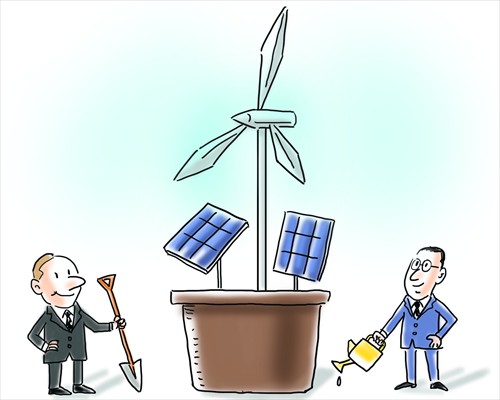Sino-EU energy cooperation essential for globally green future

Illustration: Liu Rui/GT
In the modern globalizing world, energy resources are obviously key to maintaining economic growth, as well as keeping industrial and post-industrial societies running efficiently.
Countries and regions that want to expand economically and improve the living conditions of their citizens, but are not endowed with sufficient resources of fossil fuels, obviously need to import them.
This is the situation for both China and the EU. Neither has enough oil, natural gas and coal to meet the needs of large populations demanding a decent standard of living. Both therefore have to import energy from external suppliers.
A number of problems and issues revolve around the question of how to get sufficient imports of fossil fuels. First, it's not really a good idea to put all one's energy eggs in one basket by importing from a single supplier. This is something that the EU found out to its cost when experiencing the Russia-Ukraine gas disputes of 2006 and 2009, when supplies were restricted or cut off in the middle of winter. Even today, the EU receives about 40 percent of its natural gas from Russia.
This is why it is necessary to diversify energy imports in order to ensure energy security. It would be better in this instance to import more natural gas from different suppliers in order to ensure that there will be sufficient supplies even if one source is, for some perhaps unforeseeable reason, cut off in the future.
China has a similar problem when it comes to oil. China receives approximately 80 percent of its oil imports through the narrow Straits of Malacca and the South China Sea. For this reason, China is busily stockpiling oil and beefing up its presence in the South China Sea and along the key marine trade routes. It is also seeking other routes for oil imports, such as overland via pipelines from Central Asia.
China has also had its own issues with Russian supplies of energy, since the China-Russia oil deal of 2014 has yet to produce many tangible results in terms of increased supplies.
Apart from oil, Central Asian countries such as Turkmenistan and Azerbaijan are also rich in natural gas. That makes them an obvious source of imports for both China and the EU, a fact of which both parties are acutely aware.
China is already receiving gas supplies from Turkmenistan and Kazakhstan via three pipelines, and a fourth is being constructed. The EU, however, does not yet have a functional pipeline, although there should be one from Azerbaijan by about 2018. There is also talk of constructing a Trans-Caspian pipeline to allow the transfer of gas from one side of the Caspian Sea to the other, in order to benefit both Europe and China.
Another major factor in energy security is the need to steadily move away from reliance on fossil fuels by building up renewables and nuclear energy. Both China and the EU are working on improving the affordability of solar, wind and hydroelectric power and increasing their share in the marketplace, but clearly a great deal more needs to be done. If these two global powerhouses can pool their expertise, it could benefit each of them, and the rest of the world as well.
Of course, there are a number of obstacles to such synergistic collaboration. Not least among these is the question of trust. If Europeans and Chinese do not find ways to improve relationships, communication and understanding, the path is not likely to be smooth.
The question of mutual trust is, in the end, the most crucial one. With it, everything is possible, including a completely transformed energy security picture by the middle of the century. Energy security therefore demands political will at both ends of the Eurasian landmass to create win-win synergies.
The author is a lecturer in international relations with the Jan Masaryk Centre for International Studies at the University of Economics in Prague. opinion@globaltimes.com.cn Follow us on Twitter @GTopinion